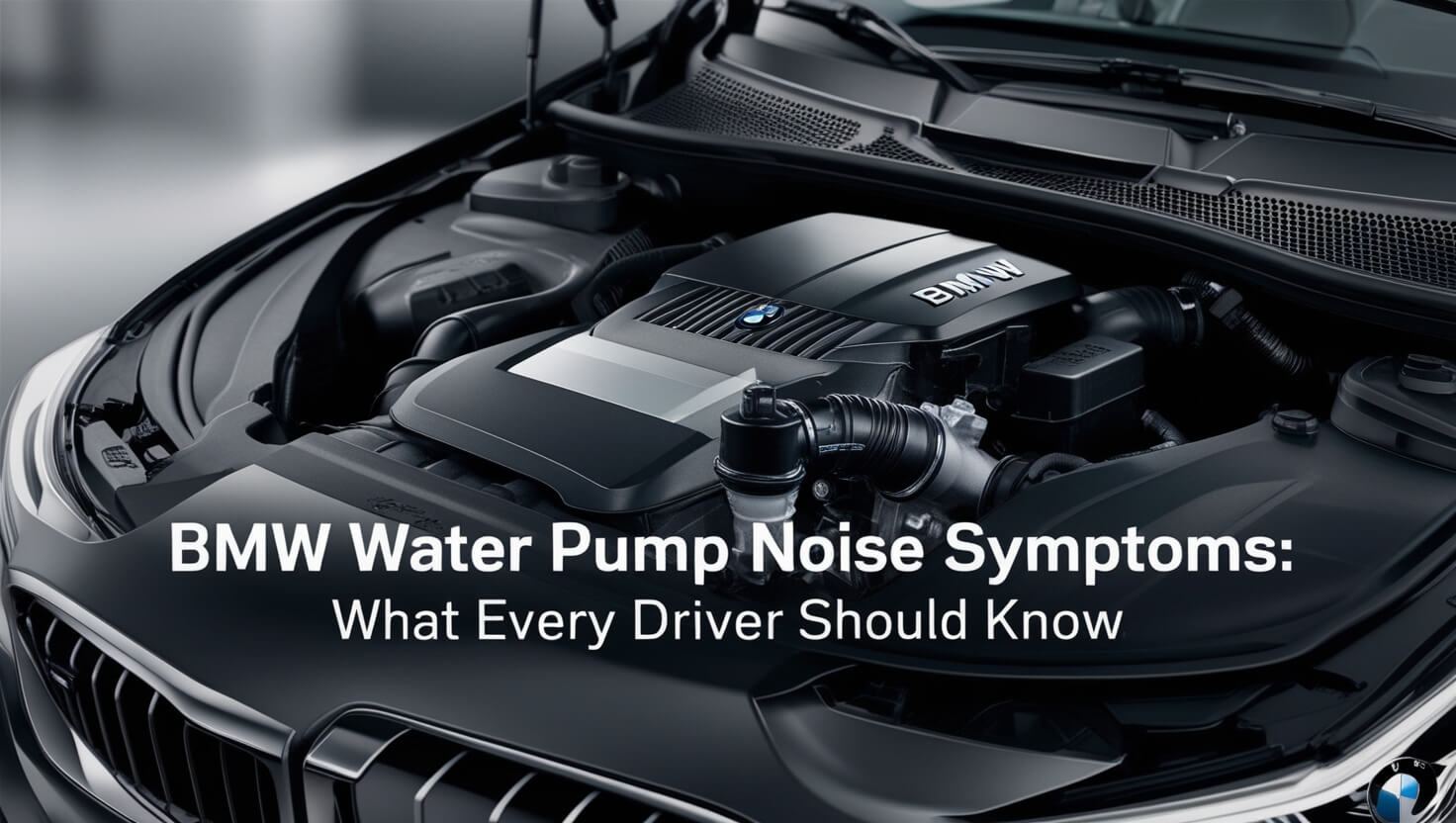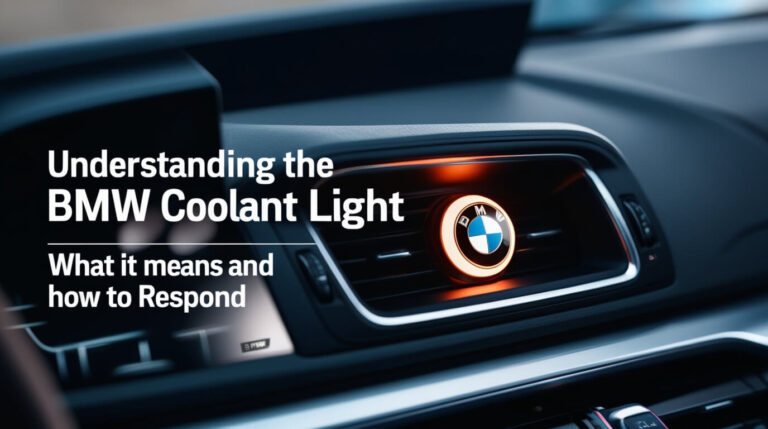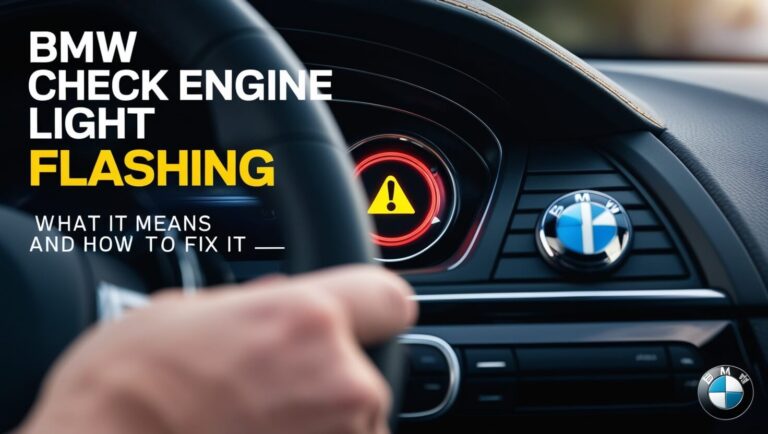
Are you hearing strange noises from your BMW’s engine? It might be your water pump. BMW water pump noise symptoms often include whining, grinding, or clicking sounds, and can indicate a serious issue that needs prompt attention. In this comprehensive guide, we’ll explore the various noises your BMW’s water pump might make, what they mean, and how to address them.
BMWs are known for their performance and precision engineering. But like any vehicle, they can develop issues over time. The water pump is a crucial component of your BMW’s cooling system, and when it starts to fail, it often signals its distress through distinctive noises.
Let’s dive into the world of BMW water pump noises and learn how to keep your Ultimate Driving Machine running smoothly.
Understanding Your BMW’s Water Pump
Before we get into the nitty-gritty of noise symptoms, it’s important to understand what your BMW’s water pump does and why it’s so crucial.
The Role of a Water Pump in BMW Engines
Your BMW’s water pump is the heart of its cooling system. It circulates coolant through the engine, radiator, and heater core. This continuous flow keeps your engine at the right temperature, preventing overheating and ensuring optimal performance.
When you’re cruising down the highway or stuck in city traffic, your water pump is hard at work. It’s constantly moving coolant to absorb heat from the engine and release it through the radiator.
How BMW Water Pumps Differ from Other Brands
BMW water pumps are a bit special. Many modern BMWs use electric water pumps instead of the traditional belt-driven ones found in most cars. These electric pumps offer several advantages:
- They’re more efficient, as they can run at variable speeds.
- They can operate even when the engine is off, helping to cool the turbocharger.
- They contribute to better fuel economy.
However, these high-tech pumps can also be more prone to failure and are often more expensive to replace.
Common BMW Water Pump Noise Symptoms
Now, let’s get to the heart of the matter – the noises your BMW’s water pump might make when it’s not happy.
High-Pitched Whining or Squealing
If you hear a high-pitched whine or squeal coming from your engine, especially when you first start your BMW, it could be your water pump. This noise often indicates that the pump’s bearings are wearing out.
Think of it like a squeaky door hinge. As the bearings wear down, they create more friction, leading to that annoying high-pitched sound. It might get louder as you accelerate, as the pump works harder.
Grinding or Rumbling Sounds
A grinding or rumbling noise is another common symptom of BMW water pump issues. This sound usually means there’s a problem with the pump’s impeller – the part that actually moves the coolant.
Imagine throwing a pebble in your washing machine. That’s kind of what a loose or damaged impeller sounds like inside your water pump. It’s not a sound you want to ignore.
Clicking or Ticking Noises
Clicking or ticking noises from your BMW’s engine area could also point to water pump problems. These sounds might mean that the pump’s shaft is loose or that there’s a problem with the electric motor in newer models.
Think of it like a clock with a broken gear. The ticking isn’t the smooth, regular sound you expect – it’s irregular and concerning.
Other Signs of BMW Water Pump Failure
While noise is often the first sign of water pump issues, it’s not the only one. Here are some other symptoms to watch out for:
Coolant Leaks and Their Connection to Pump Issues
Have you noticed bright green or pink puddles under your BMW? That’s coolant, and it shouldn’t be there. Leaks often occur when the water pump’s seals wear out or when the pump housing cracks.
It’s like a leaky faucet – except instead of wasting water, you’re losing vital coolant. And just like a dripping faucet can lead to water damage, a coolant leak can lead to engine damage if not addressed.
Engine Overheating: A Critical Warning Sign
If your BMW’s temperature gauge is creeping into the red zone, or you see the dreaded temperature warning light, your water pump might be the culprit. When the pump fails, coolant can’t circulate properly, leading to overheating.
This is serious business. An overheating engine can lead to warped cylinder heads, blown head gaskets, or even a cracked engine block. It’s like running a marathon in heavy winter clothes – your engine is working way too hard and getting way too hot.
Steam from the Radiator or Hood
Seeing steam billowing from under your BMW’s hood is never a good sign. It often means your engine is overheating, possibly due to a failed water pump.
This is your engine’s way of waving a white flag. It’s saying, “I’m too hot, and I need help now!” Don’t ignore this distress signal.
Identifying the Source of Water Pump Noises
With all these potential noises, how can you be sure it’s your water pump causing the ruckus? Let’s explore some ways to pinpoint the source.
Distinguishing Water Pump Sounds from Other Engine Noises
Engines make all sorts of noises, and not all of them are bad. To identify water pump noises:
- Listen for sounds that change with engine speed.
- Pay attention to where the noise is coming from – water pump noises usually come from the front of the engine.
- Notice if the noise is constant or intermittent.
It’s like being a detective – you’re gathering clues to solve the mystery of the strange engine noise.
DIY Methods to Locate Water Pump Issues
While it’s always best to consult a professional for definitive diagnoses, there are some things you can check yourself:
- Look for coolant leaks around the water pump.
- Check your coolant level – if it’s consistently low, you might have a leak.
- Feel the radiator hoses when the engine is warm (but not hot). They should be warm and firm.
Remember, safety first. Don’t open the radiator cap when the engine is hot, and be careful around moving parts.
The Importance of Timely Water Pump Replacement
Now that we’ve covered the symptoms, let’s talk about why it’s crucial to address water pump issues promptly.
Potential Consequences of Ignoring Water Pump Symptoms
Ignoring water pump problems is like ignoring a toothache – it won’t go away on its own, and it’ll likely get worse. Potential consequences include:
- Engine overheating
- Warped cylinder heads
- Blown head gaskets
- Cracked engine block
These issues can turn a simple water pump replacement into a major engine repair or even necessitate engine replacement. It’s the difference between a dental filling and a root canal – both in terms of complexity and cost.
How Long Can You Drive with a Noisy Water Pump?
The short answer? Not long. While you might be able to limp along for a little while with a noisy water pump, it’s not worth the risk. The potential for catastrophic engine damage is high, and it can happen suddenly.
Think of it like driving on a flat tire. You might make it a short distance, but you’re risking much more serious damage with every mile.
BMW Water Pump Maintenance and Prevention
An ounce of prevention is worth a pound of cure, especially when it comes to BMW water pumps. Let’s look at how to keep your water pump healthy.
Recommended Maintenance Schedule for BMW Water Pumps
BMW recommends replacing the water pump every 60,000 to 100,000 miles, depending on the model. However, it’s not uncommon for pumps to fail earlier, especially in high-performance models.
Regular coolant flushes and inspections can help catch issues early. Think of it like regular check-ups with your doctor – they help catch problems before they become serious.
Tips to Extend Your BMW Water Pump’s Lifespan
While you can’t prevent all water pump issues, you can take steps to extend its life:
- Use the correct coolant for your BMW.
- Keep your coolant clean and at the proper level.
- Address any overheating issues promptly.
- Have your cooling system inspected regularly.
It’s like taking care of your overall health – good habits can help prevent problems down the road.
When to Seek Professional Help
While DIY maintenance is great, there comes a time when you need to call in the pros. Here’s when to seek professional help for your BMW’s water pump.
Signs It’s Time to Visit a BMW Specialist
Consider professional help if:
- You hear persistent unusual noises from the engine area.
- Your BMW is overheating or losing coolant.
- You see the check engine light or coolant warning light.
- Your BMW is due for its regular maintenance.
It’s like going to a specialist doctor – sometimes you need expert knowledge to diagnose and treat the problem correctly.
What to Expect During a Water Pump Diagnosis
During a professional diagnosis, a BMW specialist will:
- Listen to the engine and try to isolate the noise.
- Inspect the water pump and surrounding areas for leaks.
- Check the coolant level and condition.
- Possibly use specialized diagnostic tools to check the pump’s function.
Think of it like a detective gathering evidence – the mechanic is piecing together clues to solve the mystery of your BMW’s water pump issues.
BMW Water Pump Replacement: What to Know
If your water pump needs replacement, here’s what you should know:
DIY vs. Professional Replacement
While some handy BMW owners might be tempted to replace the water pump themselves, it’s generally best left to professionals. Here’s why:
- BMWs often require special tools for water pump replacement.
- Improper installation can lead to leaks or premature failure.
- Many BMWs have electric water pumps that require careful handling.
It’s like doing your own electrical work – unless you really know what you’re doing, it’s safer and often more cost-effective in the long run to hire a pro.
Costs Associated with BMW Water Pump Replacement
The cost of replacing a BMW water pump can vary widely depending on the model and whether it’s an electric or mechanical pump. Generally, you can expect to pay between $500 and $1,500 for parts and labor.
While this might seem expensive, remember that it’s much cheaper than repairing a severely damaged engine. It’s like paying for a good set of tires – an upfront cost that saves you money and headaches in the long run.
Frequently Asked Questions About BMW Water Pump Noises
Let’s wrap up with some common questions about BMW water pump noises.
Can a Bad Water Pump Cause Other Engine Problems?
Yes, a failing water pump can lead to engine overheating, which can cause a host of other issues. These can include warped cylinder heads, blown head gaskets, and even cracked engine blocks. It’s like dominos – one failing part can set off a chain reaction of problems.
Are Electric Water Pumps in BMWs More Prone to Noise Issues?
Electric water pumps in BMWs aren’t necessarily more prone to noise issues, but when they do fail, the symptoms can be different. Instead of mechanical noises, you might experience sudden overheating or see warning lights on your dashboard. It’s like comparing a traditional watch to a smartwatch – when they have problems, the symptoms look different.
How Often Should BMW Water Pumps Be Replaced?
BMW recommends replacing water pumps every 60,000 to 100,000 miles, but many owners opt for earlier replacement, especially if they’ve had issues before. It’s like changing the oil in your car – sometimes it’s better to do it a little early than risk waiting too long.
Conclusion
Understanding BMW water pump noise symptoms is crucial for maintaining your Ultimate Driving Machine. From high-pitched whines to grinding rumbles, these noises are your BMW’s way of telling you something’s wrong. By paying attention to these symptoms and addressing them promptly, you can avoid more serious (and expensive) engine problems down the road.
Remember, your BMW’s water pump is the heart of its cooling system. Just like you wouldn’t ignore chest pain, don’t ignore these water pump symptoms. Regular maintenance, prompt attention to unusual noises, and professional care when needed will keep your BMW running smoothly for years to come.
So, the next time you hear an unusual noise from your BMW’s engine, don’t just turn up the radio. Take a moment to listen closely – your water pump might be trying to tell you something important. Happy (and quiet) driving!






